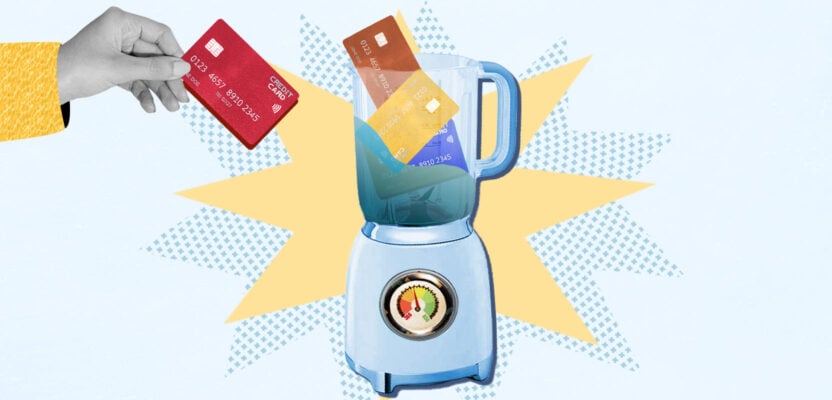Having too much credit card debt can be financially devastating. Credit card debt grows faster and faster the longer it goes unpaid as fees and interest charges snowball.
However, there are ways to get out of credit card debt. One of the most common methods is to pursue credit card debt consolidation.
Table of Contents
What is credit card debt consolidation?
Credit card debt consolidation is one of the most common ways to pay off credit card debt. It involves combining multiple credit card balances into a single balance. That balance can either be on a credit card or a loan.
The goal of credit card debt consolidation is to:
- Lower your credit card APR (i.e., your interest rate) and pay less interest each month.
- Keep all your debt in one place to easily track your progress.
- Combine your payment due dates to make it easier to remember to pay on time.
- Transfer debt under a single lender to better negotiate repayment terms.
- Shorten your overall payoff period.
5 best ways to consolidate credit card debt
There’s no one-size-fits-all method of consolidating credit card debt. The best way to do it depends on your credit score, budget, and the size of your debt.
However, there are five common and effective ways to consolidate credit card debt.
1. Apply for a debt consolidation loan
You can consolidate your credit card debt by moving it onto a debt consolidation loan. As the name suggests, these are installment loans that are specifically meant for this purpose.
Debt consolidation loans offer enough cash for you to pay off your credit card balances. Once you do, your only remaining balance will be on your loan, which you can pay off over time at a fixed interest rate.
You can get a debt consolidation loan through a:
- Bank
- Credit union
- Private lender (including many online lenders)
You should check the rates and negotiate the terms of prospective debt consolidation loans before committing to taking one out. Make sure you secure an interest rate and repayment schedule that works for you.
Pros and cons of debt consolidation loans
2. Get a balance transfer credit card
A credit card balance transfer is when you open a low-APR credit card and move all your credit card balances onto that account. Doing this consolidates your debts and reduces (and sometimes even eliminates) your interest charges.
To make a balance transfer, you need to apply for a balance transfer credit card, which should either be a 0% APR credit card or another credit card with a reduced interest rate.
Many 0% APR and low-interest credit cards for balance transfers only offer low APR for an introductory period. So you want to choose a card with a long enough introductory period for you to pay off your debts.
Pros and cons of balance transfer cards
3. Borrow against your home
If you’re a homeowner, you can take out a loan against your home’s equity (i.e., the amount of your home that you’ve paid off) in the form of a home equity loan or a home equity line of credit (HELOC).
A home equity loan is a fixed-rate installment loan, while a HELOC is a variable-rate line of credit. Unlike many debt consolidation options, your eligibility and loan amount won’t be determined by your credit score, but by your home’s equity.
While home equity loans and HELOCs often come with better interest rates than other loans and lines of credit, only use this option if you’re confident you can pay off your balance. Otherwise, as your home is used as collateral to secure the loan, you can lose your property if you fail to pay off your debt.
Pros and cons of borrowing against your home
4. Work with a credit counselor
If you’re overwhelmed trying to determine how to consolidate your credit card debts on your own, consider using a credit counseling service. You’ll get assistance from certified credit counselors who will assess your debt, your financial situation, and your credit. They’ll offer you advice and resources and may enroll you in a debt management plan.
Through a debt management plan, your credit counselor will help you create a repayment strategy (which may involve consolidating your debts) and negotiate better repayment terms (including reduced interest rates, extended deadlines, and fee waivers).
Pros and cons of credit counseling
5. Borrow against your car or 401k
Similar to taking out a home equity loan, you can secure a loan by using your car as collateral. Cash-out auto refinancing relies on you borrowing money based on the equity you have in your car.
You can also consider taking out a loan based on your 401k savings or tapping into your retirement fund directly.
This isn’t usually a good idea, as you may get hit with expensive penalties and high taxes, and it means you’ll have less money available for your retirement. It’s essentially borrowing against your future, which makes this a last-resort option.
Pros and cons of borrowing against your car or 401k
How will credit card debt consolidation affect my credit?
Debt consolidation has pros and cons, and one of the cons involves a certain amount of risk to your credit score.
If you take out a new loan or credit card to consolidate your debts, can expect to see a temporary drop in your credit score when you begin, as your lender will likely perform a hard inquiry. A hard inquiry is when a lender checks your credit after getting your application for a credit card or loan. Hard inquiries knock a few points off your score, but their effect is short-term.
However, if debt consolidation helps you pay off your credit card balances quickly, your credit score will improve in the long-term.






